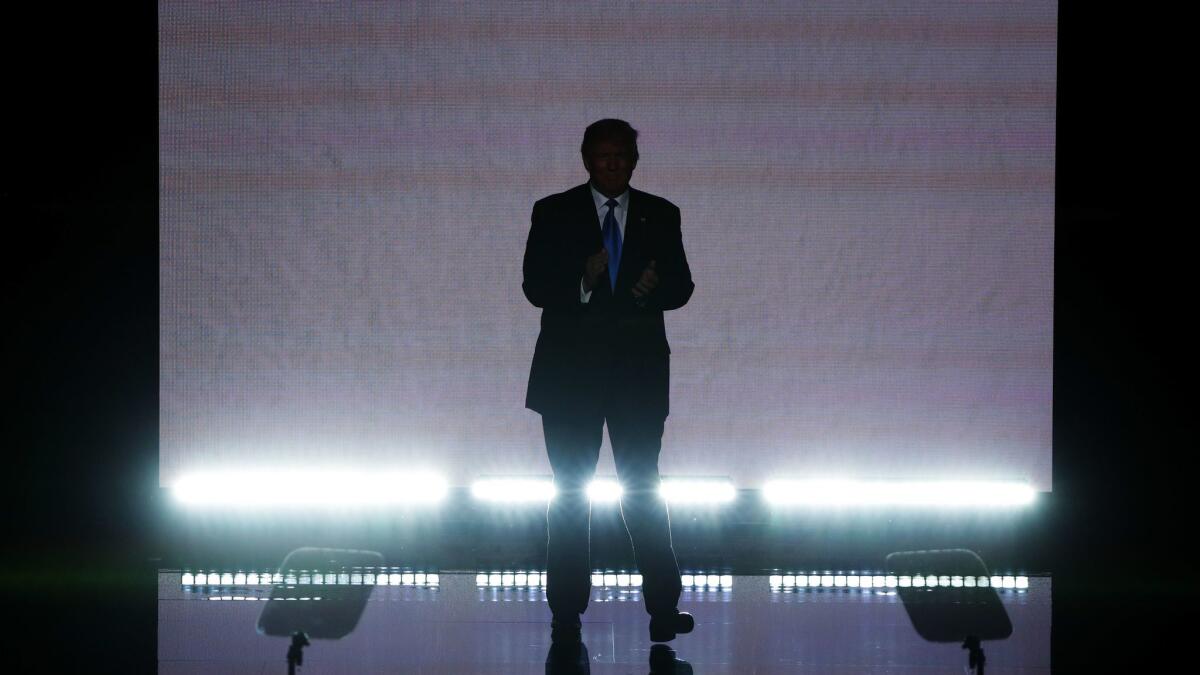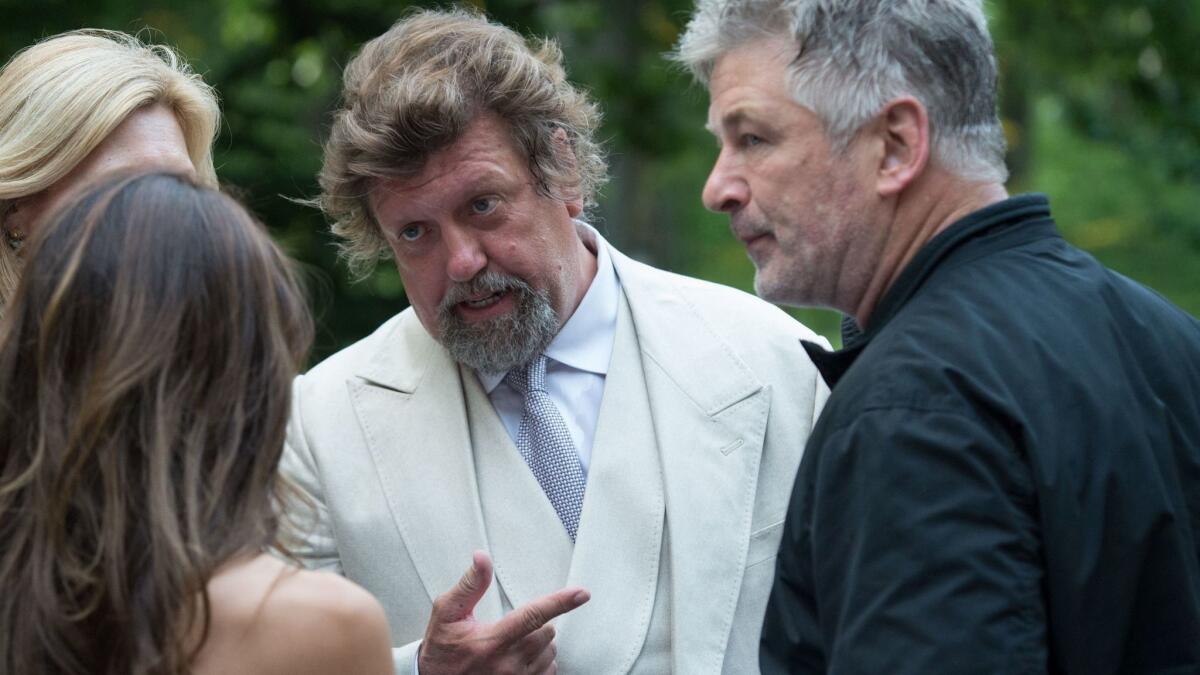Critic’s Notebook: How theater should respond to a democracy in meltdown

- Share via
How should artists respond to a nation in crisis? Playwrights and their collaborators, not wanting to be the proverbial fiddler sawing away as Rome burns, have had no choice but to contemplate their responsibility in a year of stark political turmoil.
Since Donald Trump was elected president, America has undergone a savage transformation. Institutional norms have been flouted, ethical constraints have been ignored, constitutional principles have been muddied and longstanding alliances have been kicked to the curb.
The theater, the most public-minded of the arts, has quickly answered the call of duty. Playwright Robert Schenkkan composed on crunch deadline “Building the Wall” to address what he saw as the imminent dangers of Trump’s anti-immigration policies. Documentary filmmaker Michael Moore made his Broadway debut in “The Terms of My Surrender,” a thrown-together variety show intended to buck up the resistance’s morale. And in Central Park this summer, the Public Theater’s production of “Julius Caesar” gave Caesar and Calpurnia Trump and Melania makeovers to raise political parallels that were ludicrously misinterpreted by those on the far right who had obviously never read (or properly understood) Shakespeare’s play.

A few dramatists, such as Ayad Akhtar (“Junk”) and Rajiv Joseph (“Archduke” and “Describe the Night”), took their cues from the ancient Greeks and tackled burning sociological concerns in stories set at a remove from the present. (Critical distancing is a time-tested way of overcoming partisan reflexes.)
Naturally, a good deal of theater in the last year was offered as a pure diversion from the problems of the day — plays and musicals designed to keep us sane through laughter and delight. There’s a place for all of these options in our theater. The stage is a flexible instrument, and critics who pontificate that there’s room for only one kind of work are taking a narrow view of an art form that is inherently multifarious.
THE YEAR IN REVIEW: 2017 in Entertainment
But theater artists who really want to make a difference might be advised to break free from the constant stream of infuriating updates belching from their phones. It’s not that the stage should turn a blind eye to the latest outrages. Indeed, for too long American drama seemed blithely detached from the economic conditions radically transforming our national life.
Yet playwrights have more pressing business than keeping up with the news crawl. At the moment, there’s no greater service they can provide than creating imaginative worlds for audiences to contemplatively explore.
“Contemplatively” is the crucial word. We’re already oversupplied with hypnotic traps. Hollywood has taken care of that with an army of superheroes and space invaders. But entertainment for those who like to think and want to be challenged to think harder is badly needed.
In a technological age that has atomized our attention while narrowing our interests, the theater has an obligation to use its power to restore our capacity to concentrate on something beyond our own preoccupations and pet interests. Art, in all its mimetic manifestations, requires us to relinquish our sense of control, to submit to a universe that parallels our own yet remains autonomous.
It’s troubling to read reports that President Trump, an avid TV watcher, has little inclination for reading. But even more disturbing is the impossibility of imagining him ever sitting down with a novel. America’s first reality TV president seems to lack not only the intellectual curiosity but the essential humility to give himself over to an experience that, on the surface, has nothing to do with him.
This isn’t merely a presidential problem. There has been much cultural analysis of the way we’re all locked in our niches. But a common trait unites these dis-United States: our distractedness.
The constant hum of social media, cable news, “Real Housewives,” email, texts, dating apps and all the other interruptions and time-stealers of modern life has impaired our ability to yield our attention to a single field. As a result, we’re less able to contend with the momentary boredom that can open the door to a deeper interest. We’ve become a nation of mental ice skaters, darting off in all directions with manic mindlessness.
Ambitious drama, much like a demanding novel, asks us to endure a certain effort to attain a higher reward. When we revisit “Hamlet” (I sat through four in 2017) or “Angels in America” (a marathon I will eagerly undergo again next year in New York after seeing the new National Theatre production this summer in London) or Proust’s “In Search of Lost Time” (which I waded through a second time in a more recent translation this year) some discomfort is part of the bargain. Length isn’t always the issue. The demands can stem from originality of form or content — or both, as was the case with “Mary Jane,” Amy Herzog’s compressed, cliché-denying drama about a single mother raising her disabled child.
More than telling us what to think, theater artists retrain us how to think by jarring us out of our calcified patterns of understanding. Habit, Beckett said, is a great deadener, and the mind is the first to go. The 2016 election was worrying for a number of reasons, none more so than for the way it threw into relief the widespread deterioration of critical reasoning. Drama, the art in which perspectives are brought into collision, is a powerful antidote to the sophistry and sensationalism nullifying our capacity for intelligent debate.
That might sound painfully earnest, but the Greeks understood that our profoundest pleasures aren’t superficial. The word “theater” derives from an Ancient Greek word meaning “behold,” and the stage is fundamentally a place of vision, a medium where ways of seeing are transformed.
Identifying with characters who are both like us and not like us, whose individual qualities turn out to be a subset of the universal, is a necessary corrective to the solipsistic ruts that human beings regularly fall into. Empathy is a muscle that must be regularly exercised, and there’s no better gymnasium than the theater to keep it from atrophying.
Picasso called art the lie that tells the truth, and in an era in which facts are shamelessly manipulated by politicians, fictional journeys can help develop within us an understanding that truth is an inquiry. Not all frauds are created equal. Motives count.
Drama is especially adept at cultivating an appreciation for something sorely absent in our public life today — complexity. In the finest plays, ideas are embodied and therefore personally colored. Points of view are rooted in human messiness. Politics and psychology are in cahoots. When Sophocles and Shakespeare simplify reality, as all artists must, they never lose sight of its slipperiness.
The humanities in higher education have been forced to defend their usefulness, as though college were merely a form of career training. But artists should liberate themselves from the worry of utility. The service they provide is so intrinsic to the flourishing of humanity that creativity shouldn’t ever have to justify itself.
The survival of our species, after all, is contingent on culture. In his 2004 book “Where Shall Wisdom Be Found?” written during the martial drumbeat of post-9/11 anxiety, Harold Bloom issued a stern caution: “Reading alone will not save us or make us wise, but without it we will lapse into the death-in-life of the dumbing down in which America now leads the world, as in all other matters.”
Today would seem to be a prime time for agitprop. Bring on the rabble-rousers, the worrywarts and the grievance peddlers, I say. Preaching to the choir isn’t the grave sin some critics would have us believe. (Even the most fervent choruses need bolstering from time to time.) And more power to those who want to appeal to Trump loyalists in an attempt to, if not convert them, at least respectfully grapple with their convictions.
But the efficacy of direct engagement on the issues is a pleasing fantasy of grant writers. The theater can certainly make room for preachers and pundits, but craft and imaginative vision are a playwright’s secret weapons. And political disasters, as we are all learning the hard way, are best rectified through elections.
As we impatiently wait to cast our next ballots, our dramatists, by simply practicing their ancient art, can mold us into better citizens by fine-tuning our capacity for making judgments and by widening the mental circle of our community. There’s nothing we could ask from our theatrical dreamers that their art in its purest form doesn’t already require.
SIGN UP for the free Essential Arts & Culture newsletter »
Follow me @charlesmcnulty
More to Read
The biggest entertainment stories
Get our big stories about Hollywood, film, television, music, arts, culture and more right in your inbox as soon as they publish.
You may occasionally receive promotional content from the Los Angeles Times.











